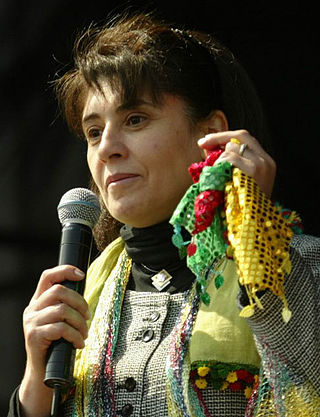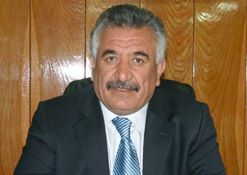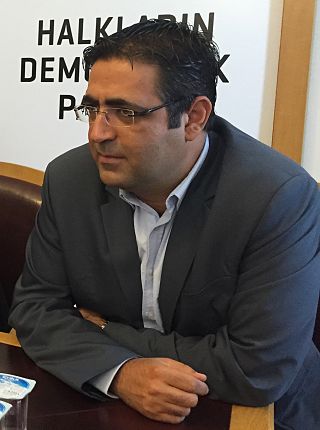
Leyla Zana is a Kurdish politician. She was imprisoned for ten years for her political activism,which was deemed by the Turkish courts to be against the unity of the country. She was awarded the 1995 Sakharov Prize by the European Parliament but was unable to collect it until her release in 2004. She was also awarded the Rafto Prize in 1994 after being recognized by the Rafto Foundation for being incarcerated for her peaceful struggle for the human rights of the Kurdish people in Turkey and the neighbouring countries.

The Democratic Society Party was a Kurdish nationalist political party in Turkey. The party considered itself social-democratic and had observer status in the Socialist International. It was considered to be the successor of the Democratic People's Party (DEHAP). The party was established in 2005 and succeeded in getting elected more than ninety mayors in the municipal elections of 2009. On 11 December 2009,the Constitutional Court of Turkey banned the DTP,ruling that the party has become "focal point of activities against the indivisible unity of the state,the country and the nation". The ban has been widely criticized both by groups within Turkey and by several international organizations. The party was succeeded by the Peace and Democracy Party.

Osman Baydemir is a Kurdish politician,lawyer and human rights activist. He was the mayor of his home town of Diyarbakır from 2004 to 2014. He was a member of the Grand National Assembly of Turkey for the Peace and Democracy Party (BDP) and also the Peoples Democratic Party (HDP).

Selim Sadak,is a Turkish politician of Kurdish origin.

Ahmet Türk is a Kurdish politician from the Peoples' Equality and Democracy Party. He has been a member of the Grand National Assembly of Turkey for several terms and was elected thrice as the Mayor of Mardin.
Emine Ayna,is a Kurdish politician. She was a member of the former Democratic Society Party (DTP). She joined the Peace and Democracy Party (BDP),after the Constitutional Court banned DTP on 11 December 2009.
Ayla Akat Ata is a Kurdish lawyer and former member of the Grand National Assembly of Turkey of the Peace and Democracy Party (BDP). She is a women's rights activist and the co-founder of the Free Women's Congress (KJA). Besides she was also involved in the negotiations between the Kurdistan Workers' Party (PKK) and the Turkish Government in 2013.
The People's Labour Party,sometimes translated as the People's Work Party,was a pro-Kurdish political party in Turkey.
The Democracy Party was a pro-Kurdish political party in Turkey founded on the 7 May 1993.
Akın Birdal is a Turkish human rights activist and politician. He was a member of the Grand National Assembly of Turkey for the Democratic Society Party (DTP) and the Peace and Democracy Party (BDP) from 2009 to 2011. He is an honorary President of the Human Rights Association of Turkey (IHD),having been its chair from 1992 to 1998. He has published a number of essays and short stories. He is married with two children.
The December 2009 Kurdish protests in Turkey were five days of protests in Turkey that ensued after a December 11,2009 ruling by the Constitutional Court of Turkey that banned the pro-Kurdish Democratic Society Party (DTP),after finding them guilty of having links to the outlawed Kurdistan Workers' Party (PKK) and spreading "terrorist propaganda."
Mahmut Alınak,is a Turkish lawyer,author and politician,of Kurdish origin,and a former parliamentary deputy.

Selma Irmak,is a Kurdish politician from Turkey and former MP for the Peace and Democracy Party (BDP) and People's Democratic Party (HDP).

The Labour,Democracy and Freedom Bloc was an electoral alliance formed by the pro-Kurdish Peace and Democracy Party (BDP) with several other smaller left-wing parties and political movements in Turkey. The alliance contested the 2011 general election by fielding candidates from participating parties as independents in order to bypass the 10% election threshold needed to win seats in the Turkish Grand National Assembly. The alliance won 5.67% of the vote,initially winning 36 MPs. The Supreme Electoral Council of Turkey later annulled the election of BDP MP Hatip Dicle in Diyarbakır,reducing the alliance's elected MPs to 35. The Bloc fielded 65 candidates in 41 provinces.

İdris Baluken is a Kurdish politician who currently serves as a parliamentary group leader of the Peoples' Democratic Party (HDP) since April 2014. He previously served as a parliamentary group leader for the Peace and Democracy Party (BDP) from 2012 until the party's MPs joined the HDP in April 2014.

Murat Bozlak,was a Kurdish politician active in several political parties. He was the president of the People's Democracy Party (HADEP) and a member of the Grand National Assembly of Turkey for the Peoples’Democratic Party (HDP). Bozlak was a Kurdish politician and a founding member of the Social Democracy Party (SODEP),the Social Democratic Populist Party (SHP),the People's Labor Party (HEP),the Democracy Party (DEP) and the HADEP. The first two parties were dissolved,while the latter three were banned by the Turkish constitutional court.
Çağlar Demirel is a Kurdish politician and a former member of the Grand National Assembly of Turkey of the Peoples' Democratic Party (HDP).
Musa Farisoğulları is a Kurdish politician and a member of the Peoples' Democratic Party (HDP).

Hasip Kaplan a Kurdish lawyer and politician;former member of the Grand National Assembly of Turkey for several parties,in 2015 he represented the Peoples Democratic Party (HDP) in the Turkish Parliament.

The Kurdish Political Movement or the Kurdish Liberation Movement,refers to the movement that seeks to realize the political demands of Kurdish people living in the geocultural region called Kurdistan in the lands of Turkey,Iraq,Syria and Iran,such as education in their native language,self-determination,autonomy or an independent state. In the context of Turkey,this movement is being pursued by democratic means through left-wing ethnic political parties,as well as through PKK affiliated militant groups.











